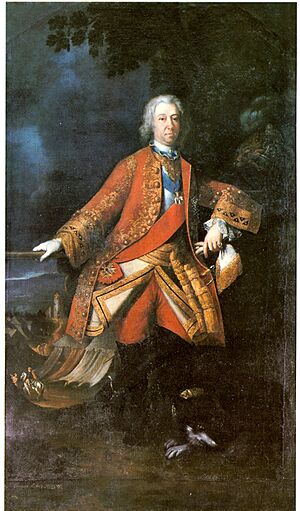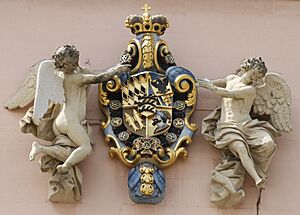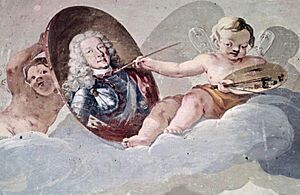Eberhard Louis, Duke of Württemberg facts for kids
Quick facts for kids Eberhard Louis |
|
|---|---|

Eberhard Louis, Duke of Württemberg
|
|
| Duke of Württemberg | |
| Reign | 23 June 1677 – 31 October 1733 |
| Predecessor | William Louis |
| Successor | Charles Alexander |
| Born | 18 September 1676 Stuttgart, Germany |
| Died | 31 October 1733 (aged 57) Ludwigsburg, Germany |
| Spouse |
Joanna Elisabeth of Baden-Durlach
(m. 1697)
|
| Issue | Friedrich Ludwig, Hereditary Prince of Württemberg |
| House | Württemberg |
| Father | William Louis, Duke of Württemberg |
| Mother | Magdalena Sibylla of Hesse-Darmstadt |
| Religion | Lutheran |
Eberhard Louis was a powerful ruler known as the Duke of Württemberg. He was born on September 18, 1676, and ruled from 1692 until his death on October 31, 1733. During his time, he made big changes to his land, including building a grand new palace.
Contents
Who Was Eberhard Louis?
Eberhard Louis was born in Stuttgart, Germany. He was the third child of Duke William Louis and his wife, Magdalena Sibylla of Hesse-Darmstadt. His father died very young in 1677. Because of this, Eberhard Louis was too young to rule. His uncle, Frederick Charles, Duke of Württemberg-Winnental, became his guardian.
In 1693, when Eberhard Louis was only 16, his mother arranged for him to become Duke. This was done with the help of Emperor Leopold I. People at the time said Eberhard Louis was not very interested in government work. He preferred hunting and let his advisors handle most of the important decisions. In 1697, he married Joanna Elisabeth of Baden-Durlach.
Military Role and New Ideas
In 1707, Eberhard Louis became a field marshal. This meant he was a high-ranking military leader. He led the troops from the Swabian region during the War of the Spanish Succession.
Around 1700, he visited Louis XIV of France at the famous Palace of Versailles. This visit gave him ideas for his own state. He wanted to make Württemberg a powerful state, much like France. To do this, he needed more money. He raised taxes, but money was still a challenge.
Building Ludwigsburg Palace
In 1704, Duke Eberhard Louis started building his grand Ludwigsburg Palace. This was a huge project. To save money and get workers, he offered a special deal. Workers who helped build the palace could live nearby without paying taxes for 15 years. Over time, a new city grew around the palace. This city became known as Ludwigsburg.
From 1711 onwards, Eberhard Louis spent more and more time in Ludwigsburg. He was often with a close companion, Wilhelmine von Grävenitz. They had a marriage ceremony in 1707. However, due to pressure from the emperor, this marriage had to be ended quickly. Wilhelmine had to leave the country for a while.
Eberhard Louis even followed her to Switzerland. They stayed there until 1710. Wilhelmine was only allowed to return to the royal court after she married another man. For over 20 years, Wilhelmine had a strong influence on the duke and his government. She helped convince him to move the main royal home and capital city from Stuttgart to the new city of Ludwigsburg. His wife, Duchess Joanna Elisabeth, stayed in the old royal palace in Stuttgart.
Succession Challenges
Sadly, Duke Eberhard Louis's only son, Prince Frederick Louis, passed away in 1731. This meant there was no direct heir to take over. Württemberg was a Protestant state, and it was very important to the people that a Protestant ruler would follow.
Because of this, Duke Eberhard Louis ended his relationship with Wilhelmine von Grävenitz. He hoped to have another child with his wife, Joanna Elisabeth, to secure a Protestant heir. However, he died in Ludwigsburg on October 31, 1733, from a stroke. He did not have any more children.
After his death, the duchy went to his cousin, Charles Alexander, Duke of Württemberg. Charles Alexander was from a different branch of the family.
A Tolerant Ruler
For his time, Eberhard Louis was seen as a very open-minded ruler. Some historians even call him "enlightened." One example of his tolerance was his choice of Oberkapellmeister, Johann Christoph Pez. Pez was a Roman Catholic, which was unusual in a Protestant court. Eberhard Louis made sure that Pez was safe from any religious unfairness.
 | Aaron Henry |
 | T. R. M. Howard |
 | Jesse Jackson |



